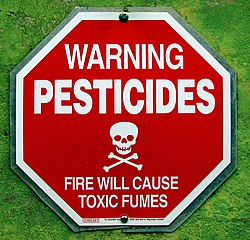Pesticide poisoning

Editor-In-Chief: Prab R Tumpati, MD
Obesity, Sleep & Internal medicine
Founder, WikiMD Wellnesspedia &
W8MD's medical weight loss NYC, sleep center NYC
Philadelphia medical weight loss and Philadelphia sleep clinics
| Pesticide poisoning | |
|---|---|

| |
| Synonyms | N/A |
| Pronounce | N/A |
| Specialty | N/A |
| Symptoms | Nausea, vomiting, diarrhea, abdominal pain, dizziness, headache, muscle weakness, seizures, respiratory distress |
| Complications | Respiratory failure, cardiac arrest, neurological damage |
| Onset | Minutes to hours after exposure |
| Duration | Variable, depending on the type and amount of pesticide |
| Types | N/A |
| Causes | Exposure to pesticides |
| Risks | Agricultural workers, pesticide applicators, children, pregnant women |
| Diagnosis | Based on history of exposure, clinical presentation, and laboratory tests |
| Differential diagnosis | Food poisoning, gastroenteritis, heat stroke, organophosphate poisoning |
| Prevention | Use of personal protective equipment, safe handling practices, proper storage of pesticides |
| Treatment | Decontamination, supportive care, antidotes such as atropine and pralidoxime |
| Medication | N/A |
| Prognosis | Depends on the type and amount of pesticide, and the timeliness of treatment |
| Frequency | Common in agricultural settings, varies by region |
| Deaths | N/A |
Pesticide Poisoning[edit]
Introduction[edit]
Pesticide poisoning refers to the harmful effects that occur from exposure to pesticides. This can result from ingestion, inhalation, or contact with the skin. Pesticides, which include insecticides, herbicides, fungicides, and others, are chemicals used to control pests but can be toxic to humans and other non-target organisms.
Types of Pesticides[edit]
Pesticides are classified based on their target organisms. Common types include:
- Insecticides - for insects
- Herbicides - for plants
- Fungicides - for fungi
- Rodenticides - for rodents
Causes and Exposure[edit]
Routes of Exposure[edit]
- Ingestion: Accidental swallowing of pesticides.
- Inhalation: Breathing in pesticide fumes or dust.
- Dermal Contact: Pesticides coming into contact with the skin.
High-Risk Groups[edit]
- Agricultural workers
- Pesticide applicators
- People living near agricultural areas
Symptoms and Effects[edit]
Symptoms of pesticide poisoning can vary based on the type and amount of pesticide exposure. They can range from mild to severe and include:
- Nausea and vomiting
- Headaches
- Dizziness
- Muscle weakness
- Respiratory distress
In severe cases, pesticide poisoning can lead to long-term health effects or even be fatal.
Diagnosis and Treatment[edit]
Diagnosis[edit]
Diagnosis is typically based on symptoms and a history of exposure. Blood and urine tests can confirm the presence of pesticides.
Treatment[edit]
Treatment depends on the type of pesticide and the severity of symptoms. It may include:
- Decontamination
- Supportive care
- Specific antidotes for certain types of pesticides
Prevention and Safety Measures[edit]

Preventive measures are crucial in reducing the risk of pesticide poisoning. These include:
- Proper storage and handling of pesticides
- Use of personal protective equipment (PPE)
- Training and education for those handling pesticides
Regulatory and Legal Aspects[edit]
Pesticides are regulated by government agencies like the Environmental Protection Agency (EPA) in the United States. Regulations cover the approval, sale, and use of pesticides to minimize the risk of poisoning.
Environmental Impact[edit]
Pesticide poisoning is not limited to humans; it also affects wildlife and the environment. Pesticides can contaminate soil, water, and air, leading to broader ecological consequences.
References[edit]
<references>
</references>
External Links[edit]
See Also[edit]
Ad. Transform your life with W8MD's Budget GLP-1 injections from $75


W8MD offers a medical weight loss program to lose weight in Philadelphia. Our physician-supervised medical weight loss provides:
- Weight loss injections in NYC (generic and brand names):
- Zepbound / Mounjaro, Wegovy / Ozempic, Saxenda
- Most insurances accepted or discounted self-pay rates. We will obtain insurance prior authorizations if needed.
- Generic GLP1 weight loss injections from $75 for the starting dose.
- Also offer prescription weight loss medications including Phentermine, Qsymia, Diethylpropion, Contrave etc.
NYC weight loss doctor appointmentsNYC weight loss doctor appointments
Start your NYC weight loss journey today at our NYC medical weight loss and Philadelphia medical weight loss clinics.
- Call 718-946-5500 to lose weight in NYC or for medical weight loss in Philadelphia 215-676-2334.
- Tags:NYC medical weight loss, Philadelphia lose weight Zepbound NYC, Budget GLP1 weight loss injections, Wegovy Philadelphia, Wegovy NYC, Philadelphia medical weight loss, Brookly weight loss and Wegovy NYC
|
WikiMD's Wellness Encyclopedia |
| Let Food Be Thy Medicine Medicine Thy Food - Hippocrates |
Medical Disclaimer: WikiMD is not a substitute for professional medical advice. The information on WikiMD is provided as an information resource only, may be incorrect, outdated or misleading, and is not to be used or relied on for any diagnostic or treatment purposes. Please consult your health care provider before making any healthcare decisions or for guidance about a specific medical condition. WikiMD expressly disclaims responsibility, and shall have no liability, for any damages, loss, injury, or liability whatsoever suffered as a result of your reliance on the information contained in this site. By visiting this site you agree to the foregoing terms and conditions, which may from time to time be changed or supplemented by WikiMD. If you do not agree to the foregoing terms and conditions, you should not enter or use this site. See full disclaimer.
Credits:Most images are courtesy of Wikimedia commons, and templates, categories Wikipedia, licensed under CC BY SA or similar.
Translate this page: - East Asian
中文,
日本,
한국어,
South Asian
हिन्दी,
தமிழ்,
తెలుగు,
Urdu,
ಕನ್ನಡ,
Southeast Asian
Indonesian,
Vietnamese,
Thai,
မြန်မာဘာသာ,
বাংলা
European
español,
Deutsch,
français,
Greek,
português do Brasil,
polski,
română,
русский,
Nederlands,
norsk,
svenska,
suomi,
Italian
Middle Eastern & African
عربى,
Turkish,
Persian,
Hebrew,
Afrikaans,
isiZulu,
Kiswahili,
Other
Bulgarian,
Hungarian,
Czech,
Swedish,
മലയാളം,
मराठी,
ਪੰਜਾਬੀ,
ગુજરાતી,
Portuguese,
Ukrainian


